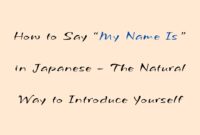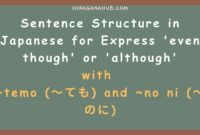Describing The Time When Going To A Place In Japanese

Japanese has simple sentence patterns to
express time
and place. This pattern is very useful when talking about schedules or
travel
plans.
Grammar / Sentence Pattern
The sentence pattern used is:
Subject + は + time + に + place + へ +
verb
This pattern is easy to understand and flexible for various contexts. Let’s
explore it further.
Components of the Sentence Pattern:
- Subject (しゅご – Shugo): The person or topic being discussed.
- Wa (は): Marks the main topic of the sentence.
-
Time (じかん – Jikan): When the activity is done, such as months, days, or
hours. - Ni (に): Indicates the time or destination.
- Place (ばしょ – Basho): The location of the destination.
- E (へ): Shows the direction toward a specific place.
- Verb (どうし – Doushi): The action or activity being performed.
Example Sentences
- I will go to America in March.
- わたしは さんがつ に アメリカ へ いきます。
- (Watashi wa sangatsu ni Amerika e ikimasu.)
- Will you go shopping at 10 o’clock?
- じゅうじ に かいもの に いきますか?
- (Juuji ni kaimono ni ikimasu ka?)
- When will you come to Japan? (Coming on May 20)
- いつ にほん に きますか? (ごがつ にじゅうにち に きます。)
- (Itsu Nihon ni kimasu ka? Gogatsu nijuu-nichi ni kimasu.)
- When will you go to France? (Going in December)
- いつ フランス へ いきますか? (じゅうにがつ に いきます。)
- (Itsu Furansu e ikimasu ka? Juunigatsu ni ikimasu.)
Tips for Using the Sentence Pattern
Vary the Nouns
To make conversations interesting, use different places and times. For
example, replace “America” with “Japan” or “France.”
Use Different Verbs
In addition to “go” (いく – iku), try using verbs like “come” (くる – kuru) or
“return” (かえる – kaeru).
Practice with Real-Life Situations
Use this pattern in daily scenarios, such as planning travel itineraries or
discussing upcoming events.
Practice Sentences
- Where will you go next month?
- Will you come to my house next week?
- At what time will we go to the park?
By understanding this pattern, you’ll find it easier to talk about schedules
and travel plans. Keep practicing and use this sentence structure in everyday
conversations!
Happy learning and good luck!


